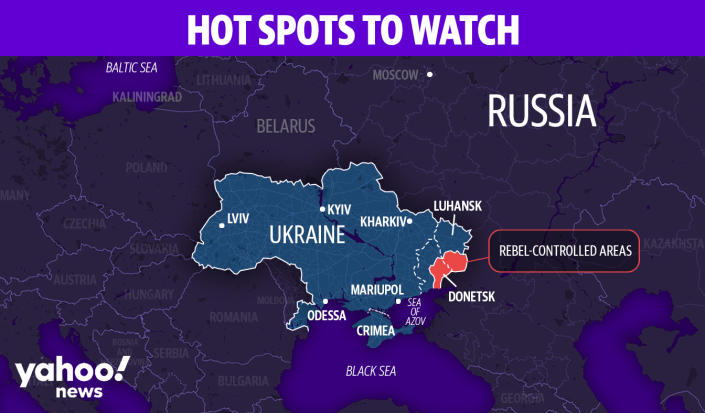In two ominous signs that Vladimir Putin may be readying an invasion of Ukraine, the Russian president on Friday signed a decree calling Russian military reservists to active training, while pro-Kremlin leaders in two breakaway “Russian-occupied” territories in eastern Ukraine ordered mobilization of men ages 18 to 55 to fight against their fellow Ukrainians.
Ukraine’s Donbas region, which holds the two Russian-controlled territories — Donetsk and Luhansk — has been the site of intensified shelling as well as gas line explosions and a car bombing on Friday. Women, children and the elderly in the area have been ordered to evacuate to Russia. Kremlin-backed separatist leaders in Donbas dubiously assert that the Ukrainian army is to blame for the open hostilities, while the U.S. believes they are so-called false flag operations committed by the separatists themselves that Russia may use to justify actively invading Ukraine’s East.
Former Russian Deputy Minister of Energy Vladimir Milov, now an opposition politician living in Brussels, views eastern Ukraine as key to Putin’s strategy.
“I believe Putin’s ultimate aim, or one of his ultimate aims, is to formally put the Russian flag in the occupied territories of Donbas,” he told Yahoo News. “It would be a relatively low-cost exercise that would be presented as another geopolitical victory.”
Unlike many other analysts, however, Milov thinks Putin may not venture further than Donbas. “To occupy a large part of Ukrainian territory, including major cities like Kyiv, Putin would need 300,000 to 400,000 full-scale combat-ready troops,” he said. “Russia does not have that amount.”
Ian Bond, a former British diplomat in Russia and current foreign policy director of the think tank Centre for European Reform, told Yahoo News that if Putin’s goal is to seize Donetsk and Luhansk, it “would significantly damage Ukraine’s economy because they’ve got a lot of heavy industry there.” But given Russia’s influence over the region, limiting an invasion to those areas of Donbas would be “a bit of a consolation prize,” Bond said, that might not “justify the impact on the Russian economy that Western sanctions might have.”
Further ratcheting up tensions, on Saturday Russia’s military conducted drills for its strategic nuclear arsenal across various parts of Russia and in the Black Sea. Meanwhile, shelling continued in Donbas, where several members of Ukrainian President Volodymry Zelensky’s party and the Parliament’s head of the national security committee were forced to take cover in shelters, according to Ukrainian media.
Like the pro-Russian separatists, Putin has baselessly accused Ukrainians in Donbas of committing genocide in the eastern part of the country. Military analyst Gustav Gressel of the European Council on Foreign Relations said Putin will likely try to use that as a pretext for invading the region.
“I’d keep a close eye on that front,” Gressel told Yahoo News. “My guess is the Russians will try to provoke an escalation.”
Brussels-based analyst Roland Freudenstein, vice president of the think tank GLOBSEC, has been observing with increasing concern Ukraine’s divided Donbas region, site of a Moscow-backed proxy war that’s killed 14,000 over eight years, as a possible site of a Russian invasion. Freudenstein points to indicators such as the vote last Tuesday in the Duma, the Russian Parliament, calling upon Putin to recognize Donetsk and Luhansk as independent from Ukraine as well as the “increase in genocide propaganda by the Russians saying that Ukrainian military is attacking Russian-speaking civilians in Donbas.”
But with the world waiting to see what Putin will do next, some analysts believe Russia may not be content to limit its military strike to Donbas.
While stressing that he’s “not a military man,” Bond said he was looking at the possibility of an attack on Kyiv. Russia might also “make amphibious landings along the Black Sea coast near Odessa,” he added, thereby “effectively cutting off Ukraine from the sea.” Cities along the Black Sea, where over 30 Russian warships have been conducting military exercises over the past week, are seen as vulnerable by other analysts as well.
Andrii Klymenko, a defense analyst with Ukraine’s Black Sea Institute of Strategic Studies, told Yahoo News via a translator, that he also views Odessa as a potential target. He sees it as a possible site of a false flag operation “that would distract attention” from what he sees as the likely first moves of a Putin offensive: declaring independence for the Donetsk and Luhansk occupied areas, and securing more territory, with the help of amphibious troops, in Donbas and the Sea of Azov, including perhaps the Ukrainian port city of Mariupol, which is crucial to Ukrainian maritime trade.
Robert, a European military and cybersecurity expert focused on Russia, who requested that his real name not be used for this article, also sees the Black Sea as a high-risk zone. “This idea of tanks rolling through Ukraine to me is a bit like movies of the Second World War,” he told Yahoo News. “Things could look very differently now — with an attack coming from the Black Sea trying to take Mariupol.”
Like others, including Bond and Gressel, Robert sees Kharkiv, a northeastern Ukrainian city of 1.4 million sitting 22 miles from the Russian border, as another potential site of invasion. If Russia took the city that is a center of industry, science and technology, “it would be a severe blow to Ukraine,” he said. Like Gressel, he suspects that Russian infiltrators are planning to stir up anti-Ukrainian protests or false flag operations there, giving Russia a reason to invade.
On the other hand, notes Centre for European Reform’s Ian Bond, Putin might use diplomatic pressure from France and Germany, who helped engineer the controversial ceasefire agreement called the Minsk Protocol, which Ukraine and Russia interpret differently, to try to whip Ukrainians into a frenzy, when all reports are they are calm and ready to fight Russia.
“If I’m Putin, I want to get people panicking and thinking there’s no point in fighting because they’re just going to get steamrolled.” Putin, he said, “could use the next few next days to ramp up diplomatic pressure, and get the French and Germans telling Zelenksy, ‘You’re not going to get any help from NATO, you need to fulfill the Minsk Agreements the way Russia wants them fulfilled.’”
“I’m sure,” Bond added, “Putin would rather achieve his objectives without having to go to war. But to do that, he’d have to increase the level of threat to the point where the opposition surrenders without having to fight.”
Former NATO analyst Edward Hunter Christie, now senior fellow at the Finnish Institute of International Affairs, thinks that the West should skip the talk about diplomacy at this stage. “Western nations should probably start to impose sanctions already,” he told Yahoo News.
Zelensky agrees. “We don’t need your sanctions after the bombardment will happen and after our country will be fired at or after we will have no borders, or after we will have no economy,” the Ukrainian president told CNN on Saturday. “Why would we need those sanctions then?”
Waiting around for Putin to reveal his next move only plays into Russia’s hands, Christie said.
“It’s much better to make clear to the Russian Federation that we don’t believe anything they say, we don’t want to do business with them, we will cancel many projects, we will not start new commercial projects with them, we will deliberately reduce economic exchanges with them as much as possible. And we should minimize diplomatic exchanges with them,” Christie said. “Engaging in diplomatic discussions with Russia is a waste of time.”




